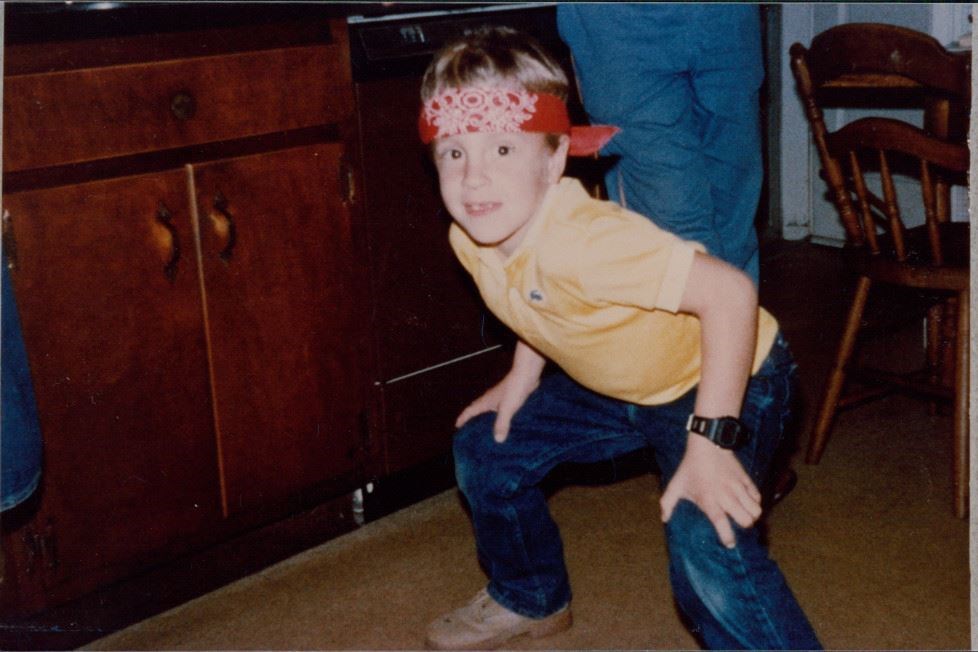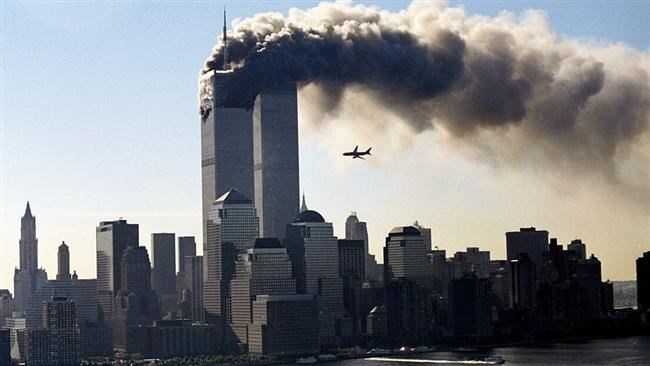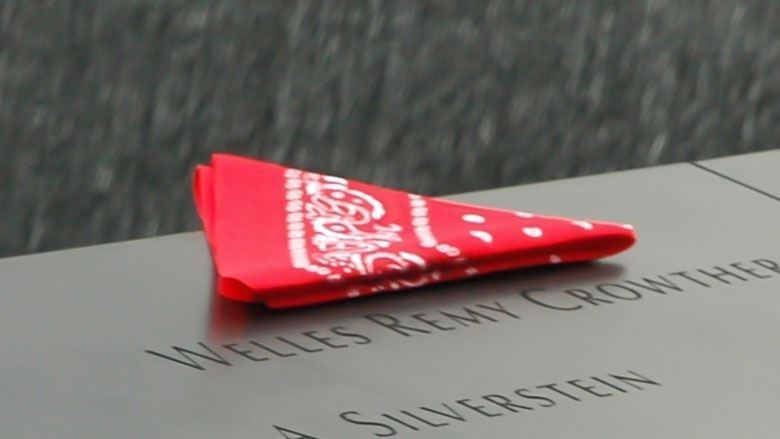"There is no 'I' in team."
-Welles Remy Crowther
 Welles always had his red bandanna around with him.nypost.comMost people fled away from the skyscrapers engulfed in flames, but one man heroically ran into the smoke to save lives. The man who ran towards the inferno was Welles Crowther. Welles Crowther, also known as the man in the red bandanna, sacrificed his life to save others during the September 11th terrorist attacks. On September 11th, 2001 Welles and thousands of other citizens were working at the World Trade Center when two airplanes crashed into the buildings. Immediately, the buildings were consumed by fire. Welles Crowther became a hero on one of the most terrifying days in United States history. A hero must put others above themselves and not succumb to fear. Welles showed his heroism through his pure altruism of giving up his own life, and his courage by running into a flaming building.
Welles always had his red bandanna around with him.nypost.comMost people fled away from the skyscrapers engulfed in flames, but one man heroically ran into the smoke to save lives. The man who ran towards the inferno was Welles Crowther. Welles Crowther, also known as the man in the red bandanna, sacrificed his life to save others during the September 11th terrorist attacks. On September 11th, 2001 Welles and thousands of other citizens were working at the World Trade Center when two airplanes crashed into the buildings. Immediately, the buildings were consumed by fire. Welles Crowther became a hero on one of the most terrifying days in United States history. A hero must put others above themselves and not succumb to fear. Welles showed his heroism through his pure altruism of giving up his own life, and his courage by running into a flaming building.
The pure altruism Welles Crowther possessed allowed him to save the lives of a dozen victims by sacrificing his own life. Welles Crowther gave up his future on 9/11 to save others. “‘Mrs. Crowther,’ the voice said, ‘your son’s body has been recovered at ground zero”(Rinaldi 103). Welles’s mother was told that her son’s remains were identified at the bottom of the World Trade Center. Welles performed the ultimate act of pure altruism, giving up his own life so that others could continue theirs. Crowther’s mother had to feel the pain and agony of losing her child, but because of Crowthers altruistic act other families did not have to go through this same tragedy. Welles prioritized other’s safety above his own, and these actions make him a hero. In addition, Welles did not stop at saving a few people and returning to safety. He went on to save more people in the face of danger. “When the young man had reached a lower floor with clean air, he’d urged the group to continue down. Then he’d left them, turned around and climbed those long flights backup, looking for others he might rescue”( Rinaldi 103). Multiple survivors shared similar accounts of Welles running back and forth guiding people to exits. Most people would be proud of saving a life, but Welles was not satisfied until he saved as many lives as he possibly could. He continued endangering his life because he saw others in need of help. His altruism compelled him to rescue all the people that he possibly could and made him a hero. Welles risked his life, then ultimately lost everything because he put others before himself. Furthermore, Welles had courage on this tragic event.
 Two planes hit the twin towers, and Welles was located in the South toweralwaght.comThe courage of Crowther allowed him to terminate fear, and sprint towards the suffocating victims. Welles did not run away like everyone else; he instead climbed towards the flames and smoke. “He was in the lobby ready to head back up the stairs along with first responders, when the tower collapsed”(Means, Sean P.). Welles was ready to go back up the stairs when the building collapsed. Welles, as an average citizen, without any protective gear that all the other first responders had was not deterred by fear. He did not let fear dictate his decision to help others. His courage allowed him to be more than the average citizen. He stood out of the pack by working with first responders and not retreating to safety, making him a hero. Furthermore, his courage was the reason many people made it out of the World Trade Center that day. “Survivors would recall a young man who appeared out of the haze of smoke and chaos and directed them to the towers only functioning stairway. Carrying a woman over his shoulder he led a group of badly injured survivors down nearly 20 flights to safety”(Baker, K.C.). The victim’s whose lives Welles saved all have a similar story, and they all recall the red bandana he was wearing to protect his lungs. Welles became a hero that day. He became a hero, though his courage by leading multiple groups of people to an exit. Welles Crowther blended in with the crowd, however when tragedy struck Welles stood out and became a leader. Most people in the tower were paralyzed with fear, and they recognized Welles Crowther’s courage. When they recognized Welles Crowther’s courage they began to follow him, and Welles led them to safety. If Welles did not have the courage to run into danger, the people who he led to an exit most likely would not have survived. Moreover, Welles is an inspiration.
Two planes hit the twin towers, and Welles was located in the South toweralwaght.comThe courage of Crowther allowed him to terminate fear, and sprint towards the suffocating victims. Welles did not run away like everyone else; he instead climbed towards the flames and smoke. “He was in the lobby ready to head back up the stairs along with first responders, when the tower collapsed”(Means, Sean P.). Welles was ready to go back up the stairs when the building collapsed. Welles, as an average citizen, without any protective gear that all the other first responders had was not deterred by fear. He did not let fear dictate his decision to help others. His courage allowed him to be more than the average citizen. He stood out of the pack by working with first responders and not retreating to safety, making him a hero. Furthermore, his courage was the reason many people made it out of the World Trade Center that day. “Survivors would recall a young man who appeared out of the haze of smoke and chaos and directed them to the towers only functioning stairway. Carrying a woman over his shoulder he led a group of badly injured survivors down nearly 20 flights to safety”(Baker, K.C.). The victim’s whose lives Welles saved all have a similar story, and they all recall the red bandana he was wearing to protect his lungs. Welles became a hero that day. He became a hero, though his courage by leading multiple groups of people to an exit. Welles Crowther blended in with the crowd, however when tragedy struck Welles stood out and became a leader. Most people in the tower were paralyzed with fear, and they recognized Welles Crowther’s courage. When they recognized Welles Crowther’s courage they began to follow him, and Welles led them to safety. If Welles did not have the courage to run into danger, the people who he led to an exit most likely would not have survived. Moreover, Welles is an inspiration.
 Welles Crowther is remembered today next to the World Trade Centernewbornpost.comWelles Crowther is now known throughout the world as one of the heroes of the 9/11 attack because of his pure altruism and courage. His altruism allowed him to save a dozen people, and his courage allowed him to run up the stairs of the burning building. Welles is an inspiration to everyone now. He is the type of person everybody should strive to be. “One boy recently told me that Welles and the bandanna are symbols of the kind of man he’d like to be”(K.C. Baker). The boy told Welles’s parents that he wanted to be like Welles when he grows up. The ultimate quality of a hero is to inspire others to be better human beings. Welles’s story has been shared across the world and continues to inspire the next generation to be better people, heroes. Welles always wanted to save lives, so he was in the process of becoming a firefighter. He never officially became a firefighter, but now he is counted among the most heroic rescuers of the 9/11 attack.
Welles Crowther is remembered today next to the World Trade Centernewbornpost.comWelles Crowther is now known throughout the world as one of the heroes of the 9/11 attack because of his pure altruism and courage. His altruism allowed him to save a dozen people, and his courage allowed him to run up the stairs of the burning building. Welles is an inspiration to everyone now. He is the type of person everybody should strive to be. “One boy recently told me that Welles and the bandanna are symbols of the kind of man he’d like to be”(K.C. Baker). The boy told Welles’s parents that he wanted to be like Welles when he grows up. The ultimate quality of a hero is to inspire others to be better human beings. Welles’s story has been shared across the world and continues to inspire the next generation to be better people, heroes. Welles always wanted to save lives, so he was in the process of becoming a firefighter. He never officially became a firefighter, but now he is counted among the most heroic rescuers of the 9/11 attack.
Works Cited
Baker, K. C. "WELLES CROWTHER a 9/11 Hero's Legacy of Courage." People, vol. 87, no. 20, 08 May 2017, pp. 73-74. EBSCOhost, search.ebscohost.com/login.aspx?direct=true&db=aph&AN=122736557&site=ehost-live
Means, Sean P. “9/11 Documentary 'Man in Red Bandana' Is a Clumsy Tribute to a Hero.” The Salt Lake Tribune, www.sltrib.com/artsliving/movies/2017/09/07/911-documentary-man-in-red-bandana-is-a-clumsy-tribute-to-a-hero/.
Rinaldi, Tom. The Red Bandanna: Young Readers' Edition. Viking, an Imprint of Penguin Random House LLC, 2017.
Page created on 4/6/2018 8:52:58 PM
Last edited 4/23/2018 12:27:42 AM
